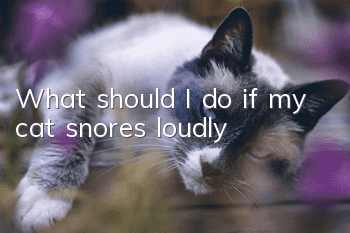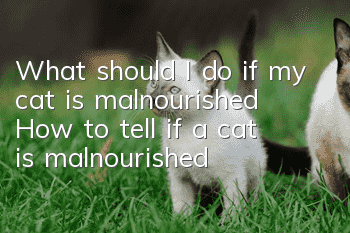What should I do if my cat snores loudly?

Generally speaking, slight snoring is not a big deal. It is a normal wheezing sound from the nasal cavity. However, if the snoring is loud and lasts for a long time, if the breathing is abnormal, it may be due to some disease.
There are many reasons for snoring. It may be due to obesity or nasal diseases such as pararhinitis or viral rhinitis.
1. Obesity
Obesity is obvious and can be observed. For different breeds, the standard definition of obesity is also different, such as round and thick cats. Such as British shorthair cats (detailed introduction), exotic shorthair cats. To determine whether this type of cat is obese, you can carefully observe the ratio of its head and belly. If you find that the cat’s belly is wider than its head, then please quickly lose weight for the cat, lower or standard, otherwise it will grow Fatter.
Long-haired and multi-haired cats, such as Chinchilla, Persian, and Himalayan cats, even if the cats have a standard figure, their thick and thick hair will make them look fat. Therefore, it is very important to judge whether this kind of cat is obese. You can observe the ratio of its head and belly when bathing the cat. If the belly is already very large and the width exceeds the head, it means that the cat is already obese.
2. Pararhinitis
Pararhinitis is also one of the causes of snoring in cats. The accessory nasal cavity refers to the space enclosed by bones that leads to the interior of the nasal cavity. If this area becomes inflamed, the nose will easily become clogged, the pressure in the nasal cavity against air will increase, and the palate will vibrate, causing snoring. Causes of pararhinitis include viral respiratory diseases, bacterial infections, etc.
3. Viral respiratory diseases
Viral respiratory diseases include viral rhinotracheitis, influenza virus infection, etc.
For viral rhinotracheitis, cats will have severe sneezing symptoms 1 to 3 days after being infected, and then gradually become lethargic, have a fever, have a severe loss of appetite and even stop eating, and their nose will initially run. The first is a clear nose, like when a person has a cold, and then gradually the nose becomes thicker and thicker like snot; tears appear, and the conjunctiva (i.e., the white of the eye) becomes red and swollen, so severe that the eyes cannot be opened. Some cats Corneal ulcers may also occur; some cats may drool and have ulcers in their mouths; as the disease progresses, symptoms of coughing and even pneumonia may occur.
For cat influenza, the main manifestations are abnormal secretions from the eyes, nose, and mouth (usually thick white or thick blue, except short-nosed red tears and sesame paste), mouth ulcers, and conjunctiva Redness, swelling, increased body temperature, etc. At present, there is still no reliable commonly used medicine to combat feline viral influenza. Therefore, doctors often recommend antibiotics and broad-spectrum antibacterial drugs to achieve certain treatment purposes and avoidDrugs that prevent long-term inflammation, high fever, and pneumonia, which can be life-threatening to cats.
Home care for sick cats is particularly important. Nasal congestion and oral ulcers will affect the cat's eating and drinking, and in severe cases may lead to dehydration and further decrease in body resistance.
Bacterial infections can be prevented through hygiene management and improving the living environment. Be very careful on weekdays. But if the purring suddenly becomes severe or the breathing is abnormal, it is an emergency and take the cat to the hospital immediately.
- What are the solutions to severe hair loss in cats?
- What is cat scratch disease? Will you definitely get cat-scratch disease if you are scratched by a cat?
- What should I do if my cat’s teeth fall out?
- How many years does a Ragdoll cat generally live? Pay attention to these feeding issues
- Should cats be shaved in summer? Is shaving cats good?
- Is it normal for a kitten’s anus to bulge?
- What do Persian cats eat? Persian cats like to eat warm food
- What smells are cats afraid of?
- What anti-inflammatory drugs should cats take after 6 months?
- How long does it take for a cat to grow all its teeth?



